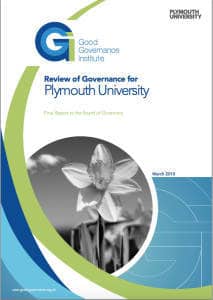The governance black box

For this latest post in the Imperfect University series I wanted to return to the ever-challenging topic of university governance and those who govern:
The role of governors to help universities navigate today’s challenges should not be underestimated, and this survey highlights where improvements can be made to ensure they are making the best possible impact.
This quote from a blog by Janet Legrand in THE refers to a recent report by LFHE on governors’ views of their institutions, leaders, and governance. This is an important and useful piece of work and, although the sample size is small, the findings and comments here look credible.

In similar vein this recent blog for HEPI by John Rushforth (reassuringly titled Governance in Higher Education: Don’t Panic) offers four big suggestions for institutions to consider when reviewing their governance:
- Composition – Is there sufficient expertise and understanding of the institutions’ core business
- Connection – Does the board get enough feedback from students and stakeholders on how well the institution is performing?
- Communication – Is there sufficient, appropriate and clear communication between the academic board or senate and the board of governors?
- Concentrate – Do they spend sufficient time on strategic outcomes and values and not too much on processes and details?
These are all very sensible questions and go to the heart of some of the governance challenges faced in universities.
Governance challenges
There have been some major governance challenges in universities in recent years. And when things go wrong in terms of governance they can go really very badly wrong indeed as some of the issues highlighted here demonstrate. In all of these cases the situation has been so bad that it has resulted in major press coverage:

- Turmoil at Plymouth University which resulted from ‘fractured’ relationships at the heart of the institution
- The Woolf inquiry into the links between the LSE and Libya which was centrally concerned with a series of governance weaknesses
- And from the US there were major issues at the University of Virginia where the President was removed from her post by governors and then reinstated.
These examples show how much universities can suffer when governance goes wrong. Despite the low level of coverage of governance, it is a critical component of institutional success and, while good governance can’t compensate for poor management, poor governance can seriously hinder a university’s progress.
The LFHE report mentioned above includes the views of governors on key university challenges and the leadership styles required:
Common challenges facing university leaders were described as financial sustainability, student recruitment and the volatile policy environment. Governors placed little, if any, emphasis on several key issues identified in recent studies of the higher education sector in the UK and internationally. For example there was little mention of ethics, the management of reputational risk, sustainable development, offshore campuses and transnational education, partnerships, or diversity-related challenges.
Governors largely felt that leadership in higher education institutions required a leadership style which reflected the distinctive culture of higher education culture and took into account the importance of concepts such as academic freedom, collegiality and scholarship. There were exceptions – some took the view that leadership skills are generic and can fit in any complex organisation – and a number of governors also felt institutions could benefit from increasing the number of leaders who have experience and expertise from other sectors.
Interestingly, though, there do not appear to be specific concerns about issues with governance nor about the need for wider understanding of the role of the governing body.
The crucial role of governing bodies
Governing bodies play a critical role in higher education and yet, despite the occasional report such as those mentioned above, they and their activities are little understood, they generally have a very low profile and are usually quite remote from the daily experience of university staff. While there are significant differences between the governing bodies of pre-1992 universities and those established since then (regarding size, composition and powers) in general the issues are very similar.
Despite the key role of the Council (or equivalent) of the university, it does seem that the vast majority of staff – both academic and professional services – are simply unaware of the role, nature, function, composition, power and meeting arrangements of their institution’s governing body. It’s all just a black box to them. It is important to stress that this is not necessarily the fault of the governors who can often be very keen to get out and about in the institution.
Where do we go from here?
It seems that to build on John Rushforth’s four big suggestions there are some specific steps that universities and their governing bodies need to consider:
- Governors do have to connect with the Senate/Academic Board be it through cross-attendance or joint events or similar.
- Beyond this, the governing body also has to ensure it is properly informed about the core issues regarding teaching and research, including through direct interactions with academic staff.
- All staff need to know about the place, role and powers of governing bodies not just senior managers. Significant internal briefing and communication effort may, therefore, be required.
- Governors – both staff and lay members – need wide exposure within the institution so that they are visible to all staff.

Engaging with governance – opening the box
This position of general ignorance about governance and governing bodies has to change. Tomorrow’s university leaders have to know how to operate at this level which means they need to have opportunities and structures which enable engagement with governing bodies. Despite the legions (600 plus) of pro vice chancellors, deans and heads of professional services who have been through the Leadership Foundation’s Top Management Programme (TMP), which does cover governance, there is still limited engagement and understanding of these key governance issues among prospective vice chancellors.
Moreover, this remains an under-researched area, and there are few investigations into university governance although the LFHE continues to try gamely to get senior university staff and governors engaged and Wonkhe is currently undertaking a research project on this very issue and has started to publish early findings about the makeup of governing bodies here.
Although effective governance, as the case studies of major institutional failings highlighted above show, is critical to universities’ success this still seems to be seen as a desperately unsexy area. Things have to change. To conclude, a quote from the Plymouth governance report which is a particularly important one to bear in mind in this context it seems to me:
4.1 iii) The ‘golden triangle’ of Chairman, Vice-Chancellor and University Secretary/Clerk to the Board sits at the heart of effective institutional governance: if one side is fractured, good governance is endangered; if two sides are fractured, governance is in peril;
If we fail to focus more efforts in this area then the possibilities of new fractures, leading to governance perils, will grow.
So whilst John Rushforth’s advice not to panic is a sensible one, we could do with a heightened state of anxiety among senior leaders about this stuff. And we need to unlock the black box.












Paul – thank you for this analysis. Having commissioned the LFHE piece I was particularly struck by the dissonance between views of governors and HE staff on same issues. Clearly a disconnect. In other sectors non exec directors of Boards are expected to get out there and “walk the talk” and learn from the frontline. We do it a bit and at Kingston in my time I had a governor ” buddy” for the Faculty …needs hard work both sides to be useful, but just one of many ideas to improve engagement.
Thank you Fiona for this – yes the “buddy” system is not uncommon but does require real investment of time on both sides to be properly effective.
Paul, an interesting piece. My own doctoral research recently completed, centred on the institutional visibility of university governing bodies – it captured the views of secretaries and clerks principally, through a professional doctoral lens but raised wider questions and a relationship between collective and individual governor institutional visibility within the ‘host’ HEI and the board effectiveness nexus.
Thank you Adam for this – sounds like a highly relevant piece of research in this very area. I do hope you are going to publish some of it.